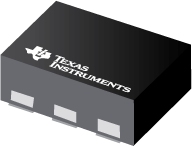Datasheet Texas Instruments TPS62730DRYT
| Manufacturer | Texas Instruments |
| Series | TPS62730 |
| Part Number | TPS62730DRYT |

Step Down Converter with Bypass Mode for Ultra Low Power Wireless Applications 6-SON -40 to 85
Datasheets
TPS6273x Step-Down Converter With Bypass Mode for Ultra Low-Power Wireless Applications datasheet
PDF, 5.4 Mb, Revision: D, File published: Dec 15, 2014
Extract from the document
Prices
Status
| Lifecycle Status | Active (Recommended for new designs) |
| Manufacture's Sample Availability | Yes |
Packaging
| Pin | 6 |
| Package Type | DRY |
| Industry STD Term | USON |
| JEDEC Code | R-PDSO-N |
| Package QTY | 250 |
| Carrier | SMALL T&R |
| Device Marking | RP |
| Width (mm) | 1 |
| Length (mm) | 1.45 |
| Thickness (mm) | .5 |
| Pitch (mm) | .5 |
| Max Height (mm) | .6 |
| Mechanical Data | Download |
Parametrics
| Control Mode | Constant on-time (COT) |
| Duty Cycle(Max) | 100 % |
| Iout(Max) | 0.1 A |
| Iq(Typ) | 0.025 mA |
| Operating Temperature Range | -40 to 85 C |
| Package Group | SON |
| Rating | Catalog |
| Regulated Outputs | 1 |
| Special Features | Enable,Light Load Efficiency,Synchronous Rectification |
| Switching Frequency(Max) | 3000 kHz |
| Switching Frequency(Min) | 3000 kHz |
| Type | Converter |
| Vin(Max) | 3.9 V |
| Vin(Min) | 1.9 V |
| Vout(Max) | 2.1 V |
| Vout(Min) | 2.1 V |
Eco Plan
| RoHS | Compliant |
Design Kits & Evaluation Modules
- Evaluation Modules & Boards: TPS62730EVM-726
Step Down Converters | Bypass Mode for Ultralow-Power Wireless, Evaluation Module, TPS62730
Lifecycle Status: Active (Recommended for new designs)
Application Notes
- AN097 - Current Savings in CC254x Using the TPS62730 (Rev. B)PDF, 855 Kb, Revision: B, File published: Feb 8, 2012
- Using a DC-DC Converter to Reduce Power (Current) Consumption In CC430 SystemsPDF, 4.6 Mb, File published: Jul 5, 2011
This application report describes a method to reduce power consumption in CC430-based systems by using a step-down converter TPS62730. - How to Measure the Control Loop of DCS-Control Devices (Rev. A)PDF, 259 Kb, Revision: A, File published: Aug 9, 2012
- High-efficiency low-ripple DCS-Control offers seamless PWM/pwr-save transitionsPDF, 605 Kb, File published: Jul 25, 2013
- Understanding frequency variation in the DCS-Control(TM) topologyPDF, 224 Kb, File published: Oct 30, 2015
- Five steps to a great PCB layout for a step-down converterPDF, 162 Kb, File published: Jan 29, 2015
- Understanding the Absolute Maximum Ratings of the SW Node (Rev. A)PDF, 755 Kb, Revision: A, File published: Jan 13, 2012
- Testing tips for applying external power to supply outputs without an input voltPDF, 110 Kb, File published: Oct 24, 2016
- Basic Calculation of a Buck Converter's Power Stage (Rev. B)PDF, 202 Kb, Revision: B, File published: Aug 17, 2015
- Choosing an Appropriate Pull-up/Pull-down Resistor for Open Drain OutputsPDF, 130 Kb, File published: Sep 19, 2011
- QFN and SON PCB Attachment (Rev. B)PDF, 821 Kb, Revision: B, File published: Aug 24, 2018
- IQ: What it is what it isn’t and how to use itPDF, 198 Kb, File published: Jun 17, 2011
- Performing Accurate PFM Mode Efficiency Measurements (Rev. A)PDF, 418 Kb, Revision: A, File published: Dec 11, 2018
When performing measurements on DC-DC converters using pulse frequency modulation(PFM)or any power save mode proper care must be taken to ensure that the measurements are accurate. An accurate PFM mode efficiency measurement is critical for systems which require high efficiency at low loads such as in smart home systems tablets wearables and metering.
Model Line
Series: TPS62730 (2)
- TPS62730DRYR TPS62730DRYT
Manufacturer's Classification
- Semiconductors > Power Management > Non-isolated DC/DC Switching Regulator > Step-Down (Buck) > Buck Converter (Integrated Switch)
